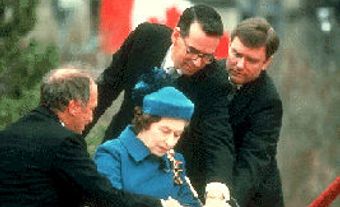In the decades since 1982, politicians and the media have recounted the same story about the patriation of Canada’s constitution and the adoption of the Charter of Rights and Freedoms. Most of the credit in this version goes to Prime Minister Pierre Trudeau. Three others are credited with breaking an impasse in the 1981 negotiations: federal justice minister Jean Chrétien, Saskatchewan attorney general Roy Romanow, and Ontario attorney general Roy McMurtry. But in his memoirs, former Newfoundland Premier Brian Peckford argues that the key intervention in the patriation process came from Peckford and the members of the Newfoundland delegation.

The long-accepted narrative goes like this. In the early 1980s, Pierre Trudeau was determined to create a charter of rights
and a procedure that would allow Canada to amend (change) its constitution without Britain’s permission. Eight provincial premiers (all but those from Ontario and New Brunswick)
opposed Trudeau’s plan. They formed the Gang of Eight to advance their own decentralized vision of Canada. (See also Federalism; Federal-Provincial Relations.) After failing to come to an agreement with the provinces, Trudeau decided to proceed without them. However, the Supreme Court’s ruling in the Patriation Reference case persuaded him to come back to the table.
According to this version of history, the decisive moment came during a federal-provincial conference in November 1981. The deadlock between Ottawa and the provinces was broken when Chrétien, Romanow and McMurtry ducked into an unused kitchen pantry at the Ottawa Conference Centre. There they reached a compromise, which journalists called the “Kitchen Accord.” Seen as the backbone of the new constitution, the agreement provided for a charter of rights and a notwithstanding clause; it would allow legislatures to exempt laws from the charter’s terms. The accord also included a provision that the constitution could be amended with the approval of the federal government and two-thirds (seven) of the provinces representing at least 50 per cent of the Canadian population. This was called the 7/50 rule.

Page 1 of the Kitchen Accord, drafted in the kitchen of the National Conference Centre in Ottawa on 4 November 1981 by Jean Chrétien, Roy Romanow and Roy McMurtry.
However, in his 2012 memoir Some Day the Sun Will Shine and Have Not Will Be No More, Brian Peckford provides documentation to support his claim that the patriation package of 1981 evolved from a Newfoundland proposal and not from the kitchen
accord. In Peckford’s account, he prepared a formal document in a meeting with delegates from several provinces. It was revised during the night of 4 November 1981, hours after the creation of the kitchen accord. The next morning, Peckford presented
the agreement to the federal-provincial conference. The federal government and all the provinces except Quebec agreed to the package. With a few changes, it became Canada’s constitution.
Peckford’s account brought long-needed balance to the story. The patriation process was highly complex. Several individuals played pivotal roles. To credit only Trudeau, Chrétien, Romanow and McMurtry is to miss a large part of what happened. Many politicians and officials were present on the night of 4 November 1981 in the Chateau Laurier suite of Saskatchewan Premier Allan Blakeney. There, six provinces accepted a revised version of Peckford’s plan. Few of the participants in that historic meeting even knew about the kitchen accord.

Page 2 of the Kitchen Accord, drafted in the kitchen of the National Conference Centre in Ottawa on 4 November 1981 by Jean Chrétien, Roy Romanow and Roy McMurtry.
This is not to say that the kitchen accord was unimportant. It might not have had any direct effect on Newfoundland or many of the other provincial delegations. But it was essential in altering the positions of Ontario and the federal government. Chrétien and McMurtry had devised an agreement that would include a notwithstanding clause to limit the force of a new charter of rights. Chrétien began to push Trudeau to accept such
a deal, unknowingly preparing him for the Peckford proposal. Ontario had also come to a place where it would accept what the Newfoundland premier put forward. It was Romanow, through the kitchen accord, and not Peckford, who had forged an agreement with
the governments of Canada and Ontario.
Brian Peckford deserves considerable credit for our constitution, alongside Trudeau, Chrétien, Romanow and McMurtry. Also important were Howard Leeson and Peter Meekison, the ministers of intergovernmental relations for Saskatchewan and Alberta, respectively. Countless other unelected officials who shunned the spotlight have been largely ignored in the history books.
People like simple stories, and the media and politicians oblige. Yet there was nothing simple about our constitutional drama of 1981.
See also: Constitution of Canada; Constitutional History; Constitutional Law; Constitution Act, 1867; Constitution Act, 1867 Document; Statute of Westminster; Editorial: Statute of Westminster, Canada's Declaration of Independence; Constitution Act, 1982; Constitution Act, 1982 Document; Patriation of the Constitution; Editorial: The Canadian Constitution Comes Home.

 Share on Facebook
Share on Facebook Share on X
Share on X Share by Email
Share by Email Share on Google Classroom
Share on Google Classroom
